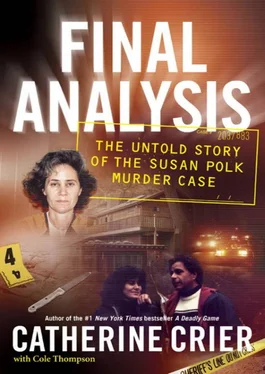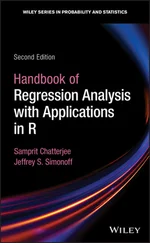“As a result of the intentional wrongful death of their father, Plaintiffs Adam and Gabriel suffer damages by way of lost love, care, comfort, and support of their father, in an amount no less than $1 million, to be proven at trial,” the suit read.
In addition to monetary compensation, Gabe and Adam were seeking declarations from the court that John Polk be named proper trustee of the Trust and that Susan have “no right, title, or interest in Trust, which may be funded by assets having a net total value of $1 million dollars.” Furthermore “‘upon conviction of murder or finding of felonious and intentional killing’ that Susan have no property right or interest in the Estate of Felix Polk or in any asset enumerated in the 1996 Polk Trust, and that she have no right or interest in Felix’s share of any community property asset, including Felix’s pension plan and the Orinda residence at 728 Miner Road.”
As a condition of her bail, Judge O’Malley set a no contact order forbidding Susan from having any contact with her son Gabriel, Dan and Marjorie Briner, Felix’s friend Barry Morris, and family lawyer Bud McKenzie. Despite harsh warnings about the repercussions of contacting any of these individuals, upon learning of the filing, Susan sent a flurry of letters to her sons. Although Gabriel refused to respond to her, Susan sent him twenty-four e-mails during this time. Her actions landed her back in jail at the West County Detention Facility in April 2005 with $5 million bail.
Susan told the court that she was simply responding to the civil suit when she contacted her youngest son via e-mail. In a letter to the court, she railed at Judge O’Malley’s April 19 decision to revoke her bail, claiming she had written to Gabriel only after her lawyers, Peter Coleridge and Jack Funk, advised her that the no contact order did not apply to legal correspondence.
“However, I was charged with 24 counts of contempt of court for 24 e-mails to Gabriel and reincarcerated and placed on a no bail hold by Judge Mary Ann O’Malley,” Susan complained in the letter.
Susan subsequently fired Peter Coleridge in May 2005, and announced her intent to act as her own counsel. Since her arrest, she had fired all three of her criminal attorneys—William Ousterhadt, Elizabeth Grossman, and now Peter Coleridge—supposedly because of disagreements over the handling of her defense. She had repeatedly refused to entertain an “insanity” defense or one using “battered woman syndrome.” She had spent much of her life running from a diagnosis of mental illness and she wasn’t about to hide behind such a claim now.
Susan would represent herself pro per. In an interview with the Contra Costa Times in the summer of 2005, she told the newspaper that she was convinced she was not going to get the defense she wanted unless she represented herself. “If I’m going to lose when represented by counsel, I might as well represent myself,” she was quoted as saying. “At least I’ll give them a fight.”
While self-representation is not a good idea for any defendant, in Susan’s case it was a particularly bad choice. In Contra Costa County, women who choose to represent themselves are at a severe disadvantage in comparison to their male counterparts. The women who are housed in the West County Detention Facility are not permitted to use the jail’s “Male Only” law library, despite many administrative complaints from defendants facing felony charges. This restriction greatly limits the amount of research that they can undertake on their own.
This fact may have played a role in the abrupt change Susan announced in late July 2005 when she asked a judge to appoint Oakland defense attorney, Daniel Horowitz, to her case. Horowitz had gained notoriety as a TV legal analyst during the Scott Peterson murder trial by stationing himself at the courthouse to offer legal commentary to cable stations in need of a sound bite. He soon became a regular on Court TV, providing analysis for the Peterson case and later in the Michael Jackson molestation trial.
Representing Susan Polk at her upcoming murder trial would be another opportunity for the lawyer to grab the media spotlight. While Horowitz had represented more than one dozen defendants in capital murder cases during his two decades as an attorney, the majority of his practice was at the Federal level, involving white-collar crimes such as money laundering and embezzlement.
According to his attorney profile, Horowitz was “a defense attorney with an extensive computer and business background” and 90 percent of his practice was devoted to litigation. Nevertheless, he was anxious to take Susan’s case to trial. In August, he asked Judge Thomas Maddock to allow him to bring his cocounsel, Ivan W. Golde, on board for the case. Judge Maddock agreed, under the condition that the county pay only Horowitz’s fee.
While Horowitz was lead counsel on the case, it was Ivan who actually persuaded Susan to meet with them. He made the initial contact while visiting a client at the West County Detention Facility where Susan was being held. During their brief conversation, Ivan convinced Susan to sit down with him and his partner, Dan, to discuss her case.
Born and raised in San Francisco’s East Bay, Golde followed in his father’s footsteps by attending law school and becoming an attorney. Unlike his dad, prominent Alameda County Superior Court Judge Stanley P. Golde, Ivan was not interested in a career on the bench. Instead, he had carved out a niche in the world of professional sports, providing legal counsel to members of the Oakland Raiders Football Club and to baseball great Ricky Henderson. Like Horowitz, Golde enjoyed the media spotlight. According to his web page, he had “done battle with Nancy Grace on Court TV…and has commentated on the Scott Peterson and Michael Jackson high profile cases.”
Susan liked Golde. He was easygoing and down-to-earth, and the two shared a common background; both had grown up in Oakland and attended the same high school (although Susan’s time there was far more limited than Golde’s). During Golde’s initial meeting with Susan, however, she had made it clear that she was not interested in being represented by counsel. She reiterated that position during the subsequent meeting with Golde and Horowitz, informing the lawyers she was not likely to change her mind.
Still, she listened intently to their advice during a series of additional meetings.
It is not known what finally led Susan to allow the lawyers to take over her case. Perhaps she was growing concerned about her ability to manage her own defense or maybe she sensed that Horowitz and Golde truly believed in her and were willing to do the work necessary to present the case she desired. Media reports claimed that Susan settled on the Horowitz/Golde team after they agreed to present a straight self-defense case and go easy during their questioning of Susan’s youngest son, Gabriel.
Once on board, it was Golde who visited Susan in jail and responded to her countless phone calls. Golde quickly developed a friendship with Susan, but over time even he grew weary of her constant needs. At one point, her demands became so great that Horowitz assigned an office assistant named Valerie Harris, whom he had met at the Scott Peterson trial, to handle Susan’s calls. At the Peterson trial, Harris had earned a reputation as something of a trial groupie because of her constant presence in the courtroom. Dan admired her interest in the case and asked her to join the firm.
When Adam Polk learned that his mother had asked Horowitz and Golde to take her case, he admonished the lawyers to be careful.
“The first time I met Dan and Ivan, I told them, ‘Listen, in two months, you guys are going to be unemployed,’” Adam later explained. “My mother has, throughout her life, for as long I have known her, exhibited a pattern of warming up to outsiders and then completely turning on them.
Читать дальше











